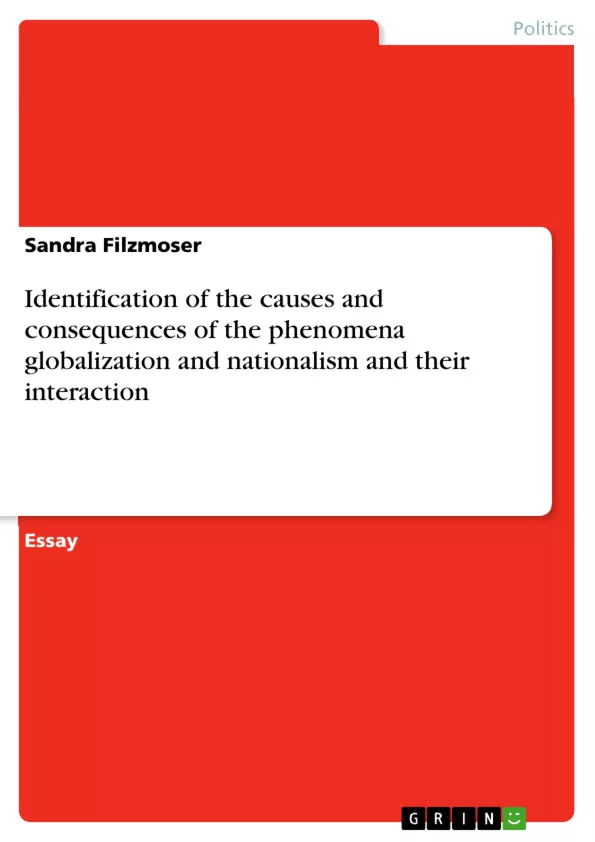Beynon and Dunkerley say that the historic roots of globalization are from the fifteenth century on. They claim that Europeans developed an ‘outward-lookingness’ which made them explore the world in contrast to other powerful nations. The era of exploration originated the first ‘world city’, namely Lisbon because of its accessibility by boat. This step towards globalization led to the expansion of knowledge in technology, geography and even of the mind, what Spybey terms ‘global consciousness’. Furthermore the longing to spread the European culture, and most striking the perception of European time and the concept of the nation-state. “[E]xamining the relationship of nation and globalization will revise our understanding of the crisis of the national state.” “[C]ontemporary globalization is not reducible to a single, causal process, but involves a complex configuration of causal logistics.” But “the following are among globalization’s most significant foundational factors: The expansion of trading relationships and the use of symbolic tokens, of which money is an obvious example; Copernicus’ concept of the world as a globe; The invention of navigational aids and the steady advance of travel technologies (...); The outward expansion of European institutions and culture; Capitalism’s insatiable drive to maximize profit leading it to ‘go global in its postmodern phase and to open up and exploit new markets with new products.”
Inhaltsverzeichnis (Table of Contents)
- Identification of the causes and consequences of the phenomena globalization and nationalism and their interaction
- Globalization
- Weakening and Strengthening of the Nation State
- Globalization and Cultural Identity
- Globalization and Non-Territorial Identity
- Globalization and Nationalism
- Nationalism
- Globalization and the Consequences for Nations
Zielsetzung und Themenschwerpunkte (Objectives and Key Themes)
This text examines the intertwined phenomena of globalization and nationalism, investigating their origins, consequences, and interactions. The analysis explores the impact of globalization on the modern nation-state, including its influence on cultural identity, the emergence of non-territorial identities, and the rise of nationalist movements. Key themes include:- The historical roots and evolution of globalization and nationalism
- The impact of globalization on the nation-state and its institutions
- The complex relationship between globalization and cultural identity, including the rise of local and non-territorial identities
- The role of nationalism as a response to globalization and its potential for conflict and social change
- The challenges and opportunities presented by the intertwined forces of globalization and nationalism in shaping the contemporary world
Zusammenfassung der Kapitel (Chapter Summaries)
The first chapter introduces the concept of globalization, tracing its roots back to the fifteenth century. It examines the historical development of globalization, highlighting its key drivers such as the expansion of trade, technological advances, and the spread of European culture. It also discusses the impact of globalization on the nation-state, exploring both its strengthening and weakening effects. The second chapter examines the relationship between globalization and cultural identity. The text explores the influence of globalization on the formation and transformation of cultural identities, including the rise of local and non-territorial identities. The authors also discuss the potential dangers of globalization, such as the threat to small nations and the promotion of social Darwinism. The third chapter focuses on the link between globalization and nationalism. The text argues that globalization has contributed to the resurgence of nationalist movements, particularly in nations without a state. It discusses the role of ethnic minorities and their quest for self-determination, highlighting the importance of cultural expression and public representation. The chapter also explores the potential consequences of unchecked nationalism, including the dangers of conflict and societal division.Schlüsselwörter (Keywords)
The text primarily focuses on the interconnected themes of globalization and nationalism. Key terms include: nation-state, cultural identity, non-territorial identity, globalization, nationalism, ethnic minorities, self-determination, social Darwinism, risk society, global commons, and transnational governance. The text explores these concepts in relation to their historical development, their impact on modern society, and their potential for shaping the future.Frequently Asked Questions
What are the historical roots of globalization mentioned in the text?
Globalization's roots go back to the 15th century with European exploration, the era of navigational aids, and the emergence of the first "world city" like Lisbon.
How does globalization affect the modern nation-state?
Globalization creates a complex relationship with the nation-state, potentially weakening its sovereignty while also prompting the state to adapt to transnational governance and global economic pressures.
Why is there a resurgence of nationalism in a globalized world?
The text suggests that nationalism often rises as a response to globalization, especially among ethnic minorities or nations without a state seeking self-determination and cultural preservation.
What is "global consciousness"?
Global consciousness refers to the expansion of knowledge and the mind, where individuals and societies become increasingly aware of the world as a single, interconnected globe.
What are the foundational factors of contemporary globalization?
Key factors include expanded trading relationships, travel technologies, the spread of European institutions, and capitalism's drive to maximize profit in a global market.
- Quote paper
- MA Sandra Filzmoser (Author), 2011, Identification of the causes and consequences of the phenomena globalization and nationalism and their interaction , Munich, GRIN Verlag, https://www.grin.com/document/200338



